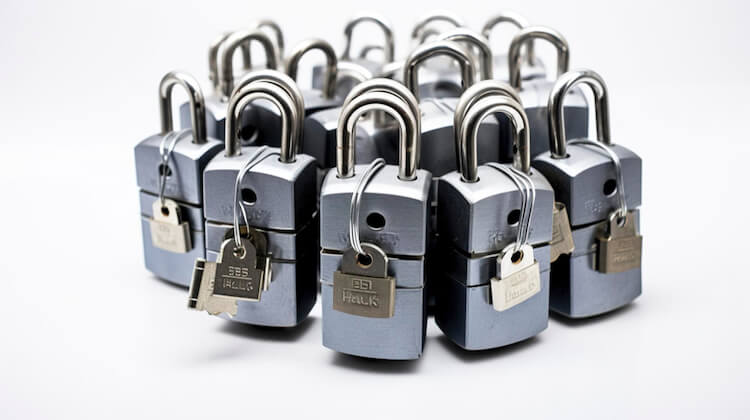
Multisig Wallet: What is Multisignature Wallet in Crypto?
- Jakob Brezigar
- Last updated: 16.June 2024
- Reading time: 7 min
In crypto, where the trust is as thin as a piece of paper and everyone’s looking to secure their digital treasure, there’s something that stands out for not just doubling, but potentially tripling (or more) the lock on your digital vault—welcome to the era of multisignature wallets. In essence, a multisignature (multisig) wallet is a digital wallet that requires multiple keys to authorize a cryptocurrency transaction, making it significantly harder for unauthorized users to access your precious assets.

Table of Contents
What is a multisig wallet?
A multisig (multi-signature) wallet is a type of cryptocurrency wallet that requires multiple private keys to authorize a transaction. This means that no single individual or entity has complete control over the funds, and multiple parties must approve a transaction before it can be executed.
How does a multisig wallet enhance security?
Multisig wallets provide an extra layer of security by ensuring that even if one private key is compromised, the funds remain safe since multiple keys are needed for authorization. It protects against single points of failure, be it due to theft, loss, or other unforeseen incidents.
How is a multisig wallet set up?
- When setting up a multisig wallet, you define the total number of keys (e.g., 3) and how many of those keys are required to sign a transaction (e.g., 2, known as “2-of-3”). Once defined, each party or device involved receives a unique private key. Only when the predefined number of keys signs a transaction will it be valid.
Multisignature wallets, often abbreviated as multisig, are a distinctive category of crypto wallet that necessitates multiple signatures, or approvals, to authorize a transaction. Unlike conventional wallets which demand only one private key to sign a transaction, multisig wallet brings in a collaborative and secure approach by requiring multiple keys for authorization.
This innovative concept embodies the decentralization ethos of blockchain, where consensus and multiple validations form the cornerstone of transaction integrity. By distributing control among multiple parties, multisig wallets significantly reduce the risks associated with placing trust in a single point of control and hence, are instrumental in enhancing the security and collaborative governance over the crypto assets held within the wallet.
Key Takeaways - Multisig Wallet:
Multisignature (multisig) wallets require multiple signatures to authorize a transaction, enhancing security over traditional single-key wallets.
Multisig wallets embody blockchain’s decentralization ethos by necessitating consensus and multiple validations for transactions.
They distribute control among several parties, reducing risks tied to a single point of failure.
These wallets are particularly valuable for collaborative governance of crypto assets.
Multisig technology significantly boosts security and trust by requiring approvals from multiple key holders to execute transactions.
What is a Multisig Wallet?
In some cases, it is desirable to have multiple levels of approval for spending cryptocurrencies. As the name suggests, multi-signature wallets require authorisation of transactions through multiple keys, meaning that a group of users is required to sign to approve a transaction.
A Multi-Signature wallet is an advanced type of digital wallet that holds the ability to require more than one signature to authorize a crypto transaction. This unique feature adds an extra layer of security and enables shared access to a single wallet.
The inherent design of multi signature wallets aids in avoiding the common pitfalls associated with traditional single key wallets. The potential use cases are expansive, ranging from business partnerships, communal fund management to safeguarding individual users against unauthorized access or loss of private keys.
By necessitating multiple approvals, a multi signature wallets embody a form of built-in consensus mechanism, fostering trust and shared responsibility among the associated private keys holders.
Single-Key vs Multisig
In the traditional single-key wallet, transactions can be initiated and completed by the holder of that one private key. However, in a multisig setup, transactions require the approval from multiple private key holders as per the pre-configured requirement.
This fundamental distinction heightens the security and collective governance over the funds stored within the wallet. Where a single key wallet has the drawback of a single point of failure, multisig wallet offers an inherent resilience against unauthorized access and mishandling of funds. The multi-dimensional authorization in multisig wallets makes them a much safer and collaborative choice, especially in scenarios where trust, accountability, and joint ownership are pivotal.

Essential Highlights of Multi-Signature Wallets
Multisig wallets entail a unique set of features that distinguish them from conventional crypto wallets.
Firstly, they demand more than one signature to authorize transactions, which adds a robust layer of security, ensuring that funds and digital assets are not easily misappropriated. The private keys can either be distributed among different individuals or be held by a single entity across different devices, making it a flexible solution for both individuals and organizations.
Every co-owner gets a unique recovery phrase, which is instrumental for funds and wallet recovery, should one lose access to their private key. Moreover, all co-owners have the ability to view the transaction history and the funds balance, promoting transparency and collective oversight over the wallet’s activities.
Types of Multisignature Wallets
The realm of multisig wallets is diverse, with various configurations like 2-of-2, 2-of-3, or 3-of-5 setups, indicating the total number of signatures required to authorize a transaction against the total number of private keys generated. These types of multisig wallets cater to different use cases.
For instance, a 2-of-3 multisig wallet is often used for escrow transactions, where a trusted third party holds one key and the other two keys are held by the transacting parties.

The flexible configuration options enable tailored solutions that can meet the specific needs and security requirements of the users, making multisig wallets a versatile choice for managing crypto assets securely.
What are Multisig Wallets Used for?
The usage of multisig wallets extends across various domains owing to their increased security and decentralized decision-making features. By requiring more than one signature to authorize transactions, multisig wallets mitigate risks associated with a single point of authority. They enable Two-Factor Authentication, where each signature acts as an additional verification layer.
Furthermore, they are instrumental in facilitating Escrow transactions, where trustless interactions are paramount. Multisig wallets are indeed a harbinger of how digital asset management can be securely and collaboratively orchestrated, thereby driving the adoption of cryptocurrencies further into the mainstream.
Where do Single-Signature Crypto Wallets Fall Short?
Single-signature wallets often fall short in security aspects, particularly in scenarios requiring shared access. The entire control and security lie within one private key, making them susceptible to single points of failure. Any mishap like losing access to the single private key or having it stolen could result in irrecoverable loss of funds.
Moreover, single signature wallets do not facilitate shared ownership or collective decision-making, making them less suitable for organizational or joint venture scenarios. These shortcomings spotlight the vital advantages multisig wallets bring to the table, especially in promoting a secure and collaborative digital assets management framework.
How Does a Multisig Wallet Work?
The modus operandi of a multisig wallet is straightforward yet robust. Transactions are initiated by one party but require the collective approval of other key holders as per the pre-set configuration to be finalized. For instance, in a 2-of-3 multisig wallet, any two keys are required to authorize a transaction. This process not only heightens security but also instills a sense of collective responsibility and consensus among the parties involved. Whether it’s an organization looking to streamline its crypto transactions approval process or individuals seeking to have shared control over a common fund, the multisig wallet stands as a beacon of security and collaborative operation.

Why Use a Multisig Wallet?
The merits of utilizing a multisig wallet are manifold. Improved security is a prime advantage as the requirement for multiple signatures drastically mitigates the risks associated with having only one private key.
Shared wallet ownership is another compelling feature, especially beneficial in organizational setups, joint ventures, or any scenario that necessitates shared financial responsibilities.
The consensus-driven authorization process fosters better governance over crypto assets, making multisig wallets a quintessential tool for modern-day digital asset management.
Advantages of Multisig Wallets

Increased Security and Private Key
By distributing the private keys among multiple parties or devices, the risk associated with hacking or unauthorized access is significantly minimized. The multisig wallet requires the collaborative effort of the key holders to authorize transactions, thereby creating a fortified defense against potential security threats. This is especially vital in an era where cyber threats are rampant and evolving.
Hot Wallet Security
Hot wallets, being online and connected to the internet, are susceptible to hacks and unauthorized access. Implementing a multisig configuration significantly bolsters hot wallet security, making it a formidable task for malicious actors to gain access and control over the funds.
Escrow Transactions
In situations where trustless transactions are required, multisig wallets shine brightly. They enable escrow transactions where a neutral third party can hold a third private key, ensuring the terms of a transaction are met before the funds are released. This feature amplifies the trust and security in transactions, making multisig wallets a preferable choice for escrow services.
Cooperation Between Multiple Parties
Multisig wallets encourage collaborative fund management and decision-making among the co-owners of the wallet. This aspect is particularly beneficial in business environments where multiple stakeholders need to have a say in the financial transactions, thereby promoting transparency and mutual accountability.
Disadvantages of Multisig Wallets
Transaction Speed
The necessity for multiple signatures can inevitably slow down the transaction processing speed, especially in a disparate group. This delay could be a hindrance in scenarios where time-sensitive transactions are crucial.
Technical Knowledge
The setup and management of a multisig wallet can be technically demanding, especially for individuals unfamiliar with blockchain technology and its respectful layers. This steep learning curve can act as a barrier for many, limiting the widespread adoption of multisig wallets.
Loss of Private Keys
One glaring downside is the risk of losing access to the wallet if the private key holders lose their keys or are unwilling to sign a transaction. This situation could potentially lock the funds indefinitely, emphasizing the need for responsible management and secure storage of the private keys.
This extensive coverage of multisig wallets showcases their imperative role in advancing the security and collaborative governance in the realm of digital asset management, significantly addressing the limitations of traditional single-signature wallets. Through multisig wallets, a new era of secure, transparent, and cooperative digital asset management is ushered in, promising a robust foundation for the growing crypto ecosystem.
In what scenarios are multisig wallets useful?
Some common use cases include:
- Organizational funds: Companies or projects can ensure that funds are not spent without the agreement of multiple stakeholders.
- Escrow services: Funds can be held in a multisig wallet until both parties fulfill agreed-upon conditions.
- Enhanced personal security: Individuals can distribute keys among trusted parties or devices, reducing the risk associated with a single compromised key or device.
How is a multisig wallet set up?
When setting up a multisig wallet, you define the total number of keys (e.g., 3) and how many of those keys are required to sign a transaction (e.g., 2, known as “2-of-3”). Once defined, each party or device involved receives a unique private key. Only when the predefined number of keys signs a transaction will it be valid.
Transitioning from a conventional crypto wallet to a multisignature wallet enhances security and collaborative handling of digital assets. Unlike a typical crypto wallet with one private key online, a multisignature wallet requires multiple private keys for authorization, significantly reducing risks of unauthorized access. The principle of using a multisig wallet embodies collective oversight over crypto assets, balancing between security and accessibility.
Moreover, a multisignature wallet facilitates structured fund recovery, in case of losing access to private keys, through the consensus of other key holders. This contrasts with the single-point recovery in standard crypto wallets, where loss of that one private key means a total loss of funds. Additionally, multisig allows for diversified storage of private keys on offline backup systems, mobile devices, or different locations, adding a security layer against potential threats.
In conclusion, using a multisig wallet promotes operational efficiency, especially in setups requiring collective authorization for transactions, thus ensuring transparency and accountability. The increased security, fund recovery features, and collaborative governance underscore the importance of multisig wallets in modern crypto wallet management, steering towards a secure and user-friendly crypto ecosystem.
Disclaimer: The information provided in this article is for informational purposes only and does not constitute financial, investment, or other professional advice. All opinions expressed herein are solely those of the author and do not represent the views or opinions of any entity with which the author may be associated. Investing in financial markets involves risk, including the potential loss of principal. Readers should perform their own research and consult with a licensed financial advisor before making any investment decisions. Past performance is not indicative of future results.

Jakob Brezigar
Jakob, an experienced specialist in the field of cryptocurrency market making, boasts an extensive international presence. With Orcabay, he has skillfully managed major operations and deals for a wide array of global stakeholders.



